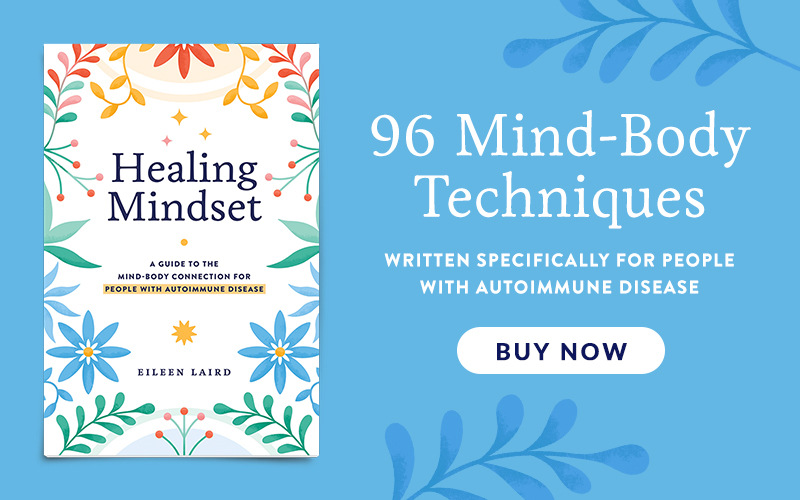
“The mind and body are not separate units, but one integrated system. How we act and what we think, eat, and feel are all related to our health. Physicians should be capable of teaching this behavior to patients.”
~ Bernie Siegel
Myth #1: It’s All In Your Head
Have you ever heard those words uttered by a doctor who couldn’t diagnose you? Or a loved one who didn’t understand why you weren’t getting better? Have you been told that your symptoms were just a manifestation of a negative mindset, and if you just thought more positively, they would go away? Were you given a referral to a psychologist or a prescription for anti-depressants and told your mind is the problem, not your body?
Sadly, this is a common experience. With autoimmune disease, it takes an average of four years and four different doctors to get an accurate diagnosis. Autoimmunity exists on a spectrum from mild to severe, and sometimes symptoms arise before damage is done. If it’s caught then, it’s much easier to treat. Unfortunately, it’s also much harder to identify. Lab tests often come back as “normal” and many doctors feel their hands are tied. They cannot offer anything until a diagnosis is certain. When you come home with no diagnosis, family and friends may disbelieve you, too. And if you get a diagnosis but it’s not curable, that’s hard for people to understand as well.
It’s incredibly disheartening and disillusioning to be in pain with no answers. It’s even worse when you’re faced with disbelief and judgment on top of everything else. If this has happened to you, let me reassure you: It’s not all in your head.
Myth #2: It Doesn’t Exist
When someone dismisses your symptoms as “all in your head”, it’s natural to become defensive about the idea of a mind-body connection at all. You may insist that your symptoms are all in your body, and your mindset has no impact. I understand that impulse, but that’s not true either. We are holistic human beings with bodies that contain more than just our blood, hormones, organs, and immune system. Our bodies also contain our thoughts and emotions, and it’s all interacting all the time – nothing happens in isolation.
We’ve all experienced this. When you get angry, does your face flush, or your hands shake, or your heart start to pound? When you’re nervous, do your palms sweat, or your knees go weak, or your stomach flutter with “butterflies”? These are immediate physiological responses to emotions, but there are also cumulative responses to chronic stress and unconscious tension. There’s a whole field of research looking at this connection. It’s called psychoneuroimmunology.
You may have noticed the word “immune” in that scientific name. Our immune system is directly impacted by stress. Stress not only increases inflammation, but it also increases the likelihood of developing autoimmune disease. And if you already have an autoimmune disease, stress increases flare activity. This will come as no surprise to most readers. When you ask people with autoimmune disease to name their biggest flare triggers, stress usually tops the list.
This doesn’t mean that stress is the sole cause of autoimmune disease (see myth #1 above). But knowledge is power. While we can’t always remove the stressor, there are many mind-body practices to help us manage stress better, and therefore manage our health better.
Myth #3: It Can Cure Everything
There will always be someone who takes something true, like the mind-body connection, and exaggerates it into something untrue: that your mind can cure all things. It’s wish fulfillment, really. It would be wonderful if it was true! Autoimmunity feels very out of our control. It’s appealing to believe that if we just “corrected” our mindset, we could eliminate this challenge from our lives.
Unfortunately, there’s harm that comes from that belief, and a lot of the people spreading this untruth don’t have autoimmune disease themselves. News headlines (and book and movie titles) are notorious for using the word “cure”. They get more viewers and sales when they do. There are also individuals who make a living selling the cure myth. Here’s the problem: It sets people up for failure with the expectation that they should be able to cure the incurable. That’s an awful burden to carry. Some people even refuse other forms of treatment, believing they’re unnecessary. That can result in permanent damage. It also diminishes respect for the true mind-body connection, by putting it in the realm of magic and fiction.
The truth is, the mind-body connection works best when both the mind and body are supported. That’s because it works both ways – what we do to support our bodies can have a beneficial effect on mental health, and what we do to support our minds can improve physical symptoms as well. That’s pretty powerful. It may not be a cure, but isn’t that magical enough?
How to Make the Mind-Body Connection Work for You
This blog post is an excerpt from my new book, which is a practical guide to harnessing the anti-inflammatory power of the mind-body connection. It’s grounded in science, but written with compassion from one autoimmune warrior to another. It includes beginner tips, troubleshooting, and most importantly – 96 ways to get started today.
You May Also Be Interested In









